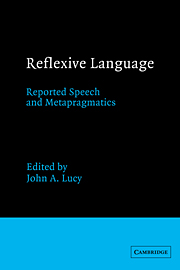Book contents
- Frontmatter
- Contents
- Acknowledgments
- General introduction
- Part I Theoretical foundations
- Part II The relation of form and function in reflexive language
- Part III Text, context, and the cultural functions of reflexive language
- Part IV Interpretation, reported speech, and metapragmatics in the Western tradition
- Introduction to Part IV
- 11 Text, transference, and indexicality
- 12 The importance of reflexive language in George H. Mead's theory of self and communication
- 13 Where epistemology, style, and grammar meet literary history: the development of represented speech and thought
- 14 Metalanguages and subjectivities
- 15 Re-creating Genesis: the metapragmatics of divine speech
- Name index
- Subject index
14 - Metalanguages and subjectivities
from Part IV - Interpretation, reported speech, and metapragmatics in the Western tradition
Published online by Cambridge University Press: 22 January 2010
- Frontmatter
- Contents
- Acknowledgments
- General introduction
- Part I Theoretical foundations
- Part II The relation of form and function in reflexive language
- Part III Text, context, and the cultural functions of reflexive language
- Part IV Interpretation, reported speech, and metapragmatics in the Western tradition
- Introduction to Part IV
- 11 Text, transference, and indexicality
- 12 The importance of reflexive language in George H. Mead's theory of self and communication
- 13 Where epistemology, style, and grammar meet literary history: the development of represented speech and thought
- 14 Metalanguages and subjectivities
- 15 Re-creating Genesis: the metapragmatics of divine speech
- Name index
- Subject index
Summary
Since the beginnings of the modern era, the trope of language has underlain the Western figuration of subjectivity. Behind Descartes' cogito argument is a dico variant (“I am, I exist [ego sum, ego existo] is necessarily true each time that I pronounce it, or that I mentally conceive it”), and the deconstructionist turn in the humanities and social sciences suggests that although the royal road to the unconscious may be through dreams, its bedrock is constructed out of the rhetorical structures of language. Not only are the terms that Freud uses for the various defense mechanisms a veritable catalogue of traditional rhetorical devices, but the concepts of what is translated into English as the ego, superego, and id are originally metaphorical extensions of the German pronominal system — das Ich, das Über-Ich, and das Es. The issues raised are deconstructionist in their insistence that our models of subjectivity come from the subtle interplay between rhetoric and reference, Bakhtinian in that all such models depend on genre-specific forms of narration and their metalinguistic relations, and Whorfian in the relativistic implications of the cross-linguistic variability of metalinguistic structures.
This chapter attempts to clarify some of these issues by first examining the metalinguistic structures available for representing speech and thought in what Whorf (1956) called SAE (Standard Average European — primarily the modern Romance and Germanic languages); these include direct and indirect quotation/discourse, and particular attention is paid to the interplay between expressive presentations of subjectivity characteristic of direct discourse and the more propositional representations characteristic of indirect discourse.
Information
- Type
- Chapter
- Information
- Reflexive LanguageReported Speech and Metapragmatics, pp. 365 - 392Publisher: Cambridge University PressPrint publication year: 1993
Accessibility standard: Unknown
Why this information is here
This section outlines the accessibility features of this content - including support for screen readers, full keyboard navigation and high-contrast display options. This may not be relevant for you.Accessibility Information
- 5
- Cited by
